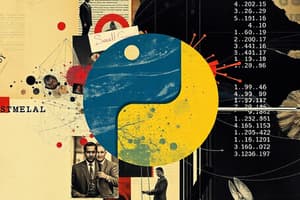Podcast
Questions and Answers
Variables in programming are named entities that hold values temporarily during program execution.
Variables in programming are named entities that hold values temporarily during program execution.
True (A)
In Python, strings are always enclosed in double quotes.
In Python, strings are always enclosed in double quotes.
False (B)
Booleans in programming can only have two possible values: True and False.
Booleans in programming can only have two possible values: True and False.
True (A)
Numeric types in programming include integers and complex numbers.
Numeric types in programming include integers and complex numbers.
Variables in Python allow you to assign names to data, making it easier to reference and work with them.
Variables in Python allow you to assign names to data, making it easier to reference and work with them.
Data types in programming determine only the size of the values.
Data types in programming determine only the size of the values.
Flashcards are hidden until you start studying
Study Notes
Mastering Fundamentals: Variables and Data Types in Programming
As you embark on your programming journey, understanding variables and data types is essential for crafting meaningful applications. These foundational concepts allow you to effectively represent and manipulate information within your programs.
Variables
Variables are containers that hold values during the execution of a program. They are named entities that enable you to interact with data at any point in your code. Consider the following example in Python:
my_variable = 5
print(my_variable) # Output: 5
In this example, my_variable is a variable that stores the value 5. Variables enable you to assign names to data, making it easier to reference and work with them throughout your program.
Data Types
Data types determine the properties and behavior of values, such as their size, range, and semantics. In programming, there are several commonly used data types:
-
Numeric Types: Numerics include integers (whole numbers) and floating-point numbers (decimals). In Python:
my_integer = 42 my_float = 3.1415 -
Strings: Strings are sequences of characters enclosed in single or double quotes. In Python:
my_string = "Hello, World!" my_string_again = 'Programming is fun!' -
Booleans: Booleans represent logical states, such as
TrueorFalse. In Python:my_boolean = True my_boolean_again = False -
Lists: Lists are ordered collections of elements enclosed in square brackets. In Python:
my_list = [1, 2, 3, 4, 5] -
Dictionaries: Dictionaries are key-value pair collections enclosed in curly braces. In Python:
my_dictionary = {'name': 'Alice', 'age': 25}
Each data type has its own characteristics and behaviors, allowing you to manipulate and process data in various ways.
By understanding and utilizing variables and data types, you'll acquire the essential skills needed to create powerful programs. These fundamental concepts serve as the foundation on which all other programming knowledge is built. Happy coding!
Studying That Suits You
Use AI to generate personalized quizzes and flashcards to suit your learning preferences.




